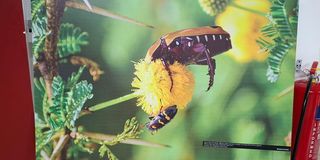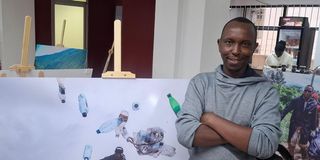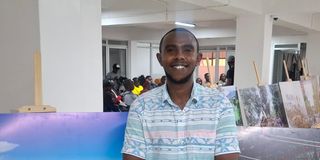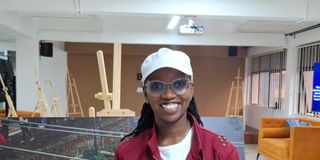Frames of Nakuru: Capturing a city's soul through the lens

Melinah Jepkemoi, affectionately known as Mel, poses beside her displayed work at the first Frames of Nakuru Exhibition on July 19,2025.
At the Frames of Nakuru Exhibition one photo captures a pineapple vendor, his wheelbarrow parked at his usual corner, waiting. He stood there like he always had, his patience becoming part of the scene.
This photo was taken by Melinah Jepkemoi, affectionately known as Mel, the only female exhibitor in the show.
Mel describes her journey into photography as purely passion-driven, sparked years ago by her sister, who is also a photographer. She never intended to make a business out of it.

A photo of beetles taken by Ben Omwaka displayed work at the first Frames of Nakuru Exhibition on July 19,2025.
“I take photos based on how I feel, not what others are doing,” she notes. “Photography has helped me with my mental health, too, and is a way for me to process life.”
Her series focuses on Nakuru as it is, especially on Sundays, when the streets slow down. But the shot of a pineapple vendor set the tone for the rest.
“That photo was the first one I took, and it influenced everything else. It reminded me that Nakuru is deeply cultured in hustle. People here fend for themselves, day by day,” she says.
Her projects involve walking the streets of Nakuru and simply observing street vendors, daily commuters, and the changing skies.
The result has been images that, while ordinary at first glance, reveal deeper tales about resilience, stillness, and the beauty of routine.
Renowned photojournalist and plastic waste campaigner James Wakibia, who exhibited a series focused on environmental justice and climate change, says the exhibition offered a powerful platform to spotlight real issues.

Renowned photojournalist and plastic waste campaigner, James Wakibia, poses in front of his displayed work at the first Frames of Nakuru Exhibition on July 19,2025.
“Photography can be used to tell stories that matter. Whether it's the life of a waste picker or the aftermath of a flood, we can’t look away,” he says.
Wakibia’s work featured emotionally charged frames, including one of waste pickers sifting through garbage without protective gear. He says the image is meant to spark concern and action.
For Mwaura Gathua, photography began as part of his job in journalism but quickly evolved into a calling of visual storytelling. Now, with nearly five years of experience, he views photography as a profession and a personal passion.

Mwaura Gathua poses in front of his displayed work at the first Frames of Nakuru Exhibition on July 19,2025.
“I realized that a single image could tell a whole story without needing a caption,” he says. “That’s when I knew I wanted to take it seriously.”
He says his photos aimed to romanticize Nakuru by capturing the subtle beauty of city life and its outskirts.
One of his favorite pieces shows a vehicle winding through a tarmacked road in the green hills of Olkaria, a remote area inhabited by the Maasai community. The image, he says, reflects how civilization is slowly reaching even the most rural parts of the county.
Having monetized his craft, Gathua says the growing recognition of photography in Nakuru gives him hope.
“Exhibitions like this are important,” he says. “They help the public and institutions take visual storytelling seriously.”
Baraza Media Lab’s Events and Communications Coordinator, Nyangari Lucy, says the idea behind Frames of Nakuru was to shift the lens from photographers being just image-makers to storytellers whose work deserves deeper reflection.

Nyangari Lucy, Baraza Media Lab’s Events and Communications Coordinator, during an interview on July 19,2025.
“A lot of times, we see the image but not the person behind the lens, or the thought process that went into it,” she notes.
Nyangari adds that they are committed to building a creative home for photographers and journalists in Nakuru, and many more such exhibitions should be expected.
“We want them to feel seen, heard, and supported. That’s why these images will remain mounted on our walls so that anyone who walks in knows Nakuru has a story, and it’s being told by its people,” she concludes.


